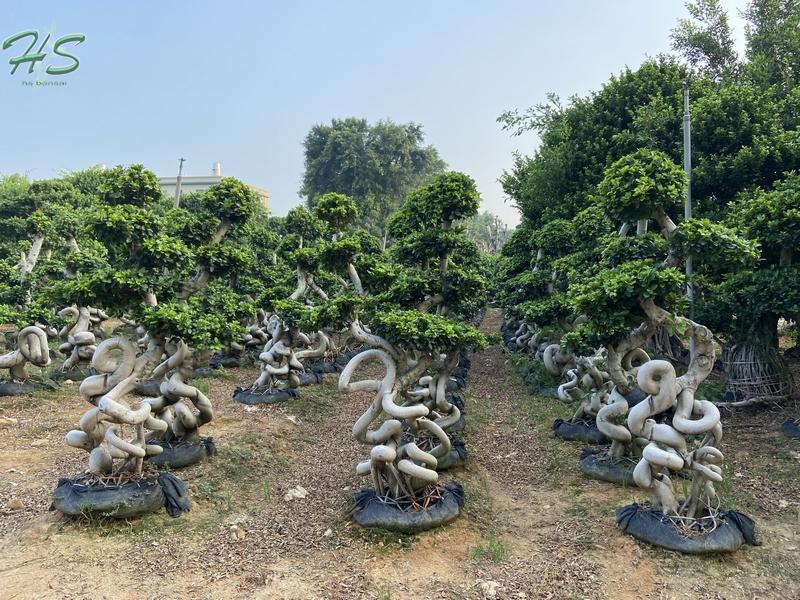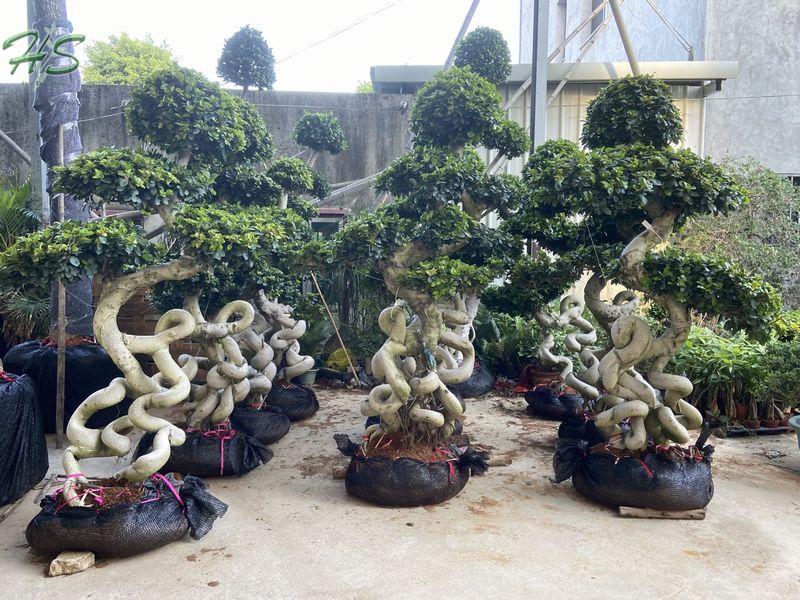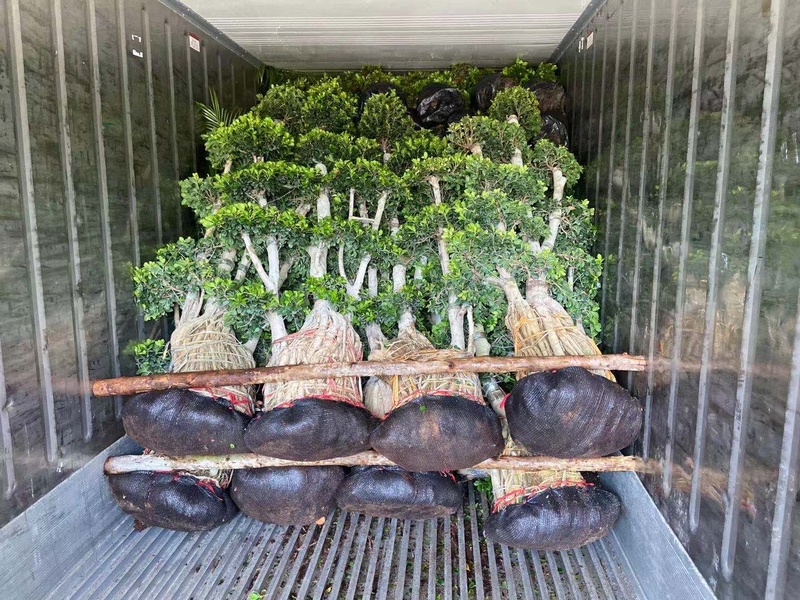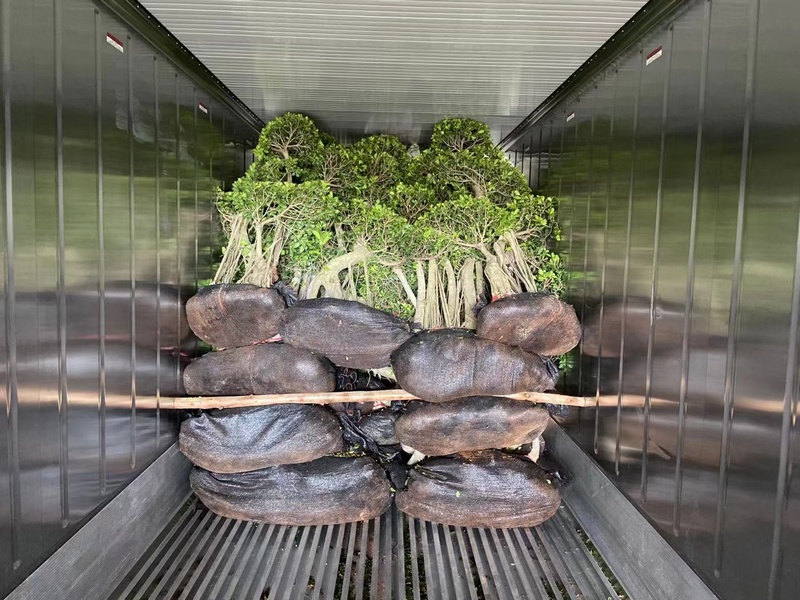The Figure-Eight Leaf Banyan: A Unique Natural Wonder
The Figure-Eight Leaf Banyan, scientifically known as Ficus microcarpa 'Figure-Eight', is a distinctive variety of the banyan tree, celebrated for its uniquely shaped leaves that resemble the number "8". This ornamental plant is a popular choice in gardens and landscapes due to its aesthetic appeal and symbolic significance.
Native to tropical and subtropical regions, this evergreen tree thrives in warm, humid climates and can adapt to various soil conditions. Its glossy, leathery leaves form a natural figure-eight pattern, making it a captivating visual feature. In many cultures, the number 8 symbolizes prosperity and balance, adding to the plant’s charm.
Ideal for bonsai cultivation or as a shade tree, the Figure-Eight Leaf Banyan is low-maintenance and resilient. It requires ample sunlight and moderate watering, making it suitable for both indoor and outdoor settings. Whether used as a decorative element or a symbolic gift, this plant brings a touch of elegance and natural harmony to any environment.
Item NO.:
HSDSPayment:
T/TProduct Origin:
ChinaColor:
GreenShipping Port:
Xiamen portLead Time:
7-10day
Complete Care Guide for Ficus microcarpa (Chinese Banyan / Ginseng Ficus)
The Ficus microcarpa, commonly known as the Chinese Banyan, Cuban Laurel, or often sold as "Ginseng Ficus" due to its thick, bulbous roots, is a popular and resilient houseplant. With its glossy green leaves and often intriguing aerial root structure, it makes for a beautiful architectural statement. Here’s how to keep it thriving.
1. Light
Ideal: Bright, indirect light is best. A spot near an east or south-facing window (with a sheer curtain for filtration) is perfect.
Tolerates: It can adapt to medium light levels but may grow more slowly and become less dense.
Avoid: Direct, harsh afternoon sun can scorch the leaves. Too little light will cause leaf drop and leggy growth.
2. Watering
This is the most critical aspect of care. The goal is consistent moisture, not sogginess.
How to Check: Before watering, stick your finger 2-3 inches (5-7.5 cm) into the soil. Water only when the top inch of soil feels dry.
How to Water: Water thoroughly until water flows freely from the drainage holes. Empty the saucer afterward to prevent the roots from sitting in water.
Seasonal Adjustments: Water more frequently in the spring and summer (growing season) and reduce watering significantly in the fall and winter, allowing the soil to dry out more between sessions.
Signs of Trouble: Yellow leaves often indicate overwatering. Crispy, brown leaves or leaf drop suggest underwatering.
3. Temperature & Humidity
Temperature: Prefers average room temperatures between 65°F - 75°F (18°C - 24°C). It is sensitive to cold drafts and sudden temperature changes. Avoid placing it near heating or air conditioning vents, or drafty doors and windows. Do not expose it to temperatures below 50°F (10°C).
Humidity: While it tolerates average household humidity, it thrives in higher humidity.
To Increase Humidity: Mist the leaves regularly, place the pot on a pebble tray filled with water, or use a humidifier nearby. This is especially important in winter when indoor air is dry.
4. Soil & Fertilizing
Soil: Use a well-draining, peat-based potting mix. A standard all-purpose potting soil is fine, but you can add a handful of perlite or orchid bark to improve drainage.
Fertilizer: Feed with a balanced, water-soluble fertilizer (e.g., 10-10-10) diluted to half strength every 4-6 weeks during the spring and summer.
Do Not Fertilize: During the fall and winter when plant growth naturally slows down.
5. Pruning and Shaping
Pruning: Pruning is essential to maintain your desired shape and encourage bushier growth. The best time to prune is in the late spring or early summer.
Use clean, sharp scissors or pruning shears.
You can safely remove up to a third of the foliage at one time.
Trim back long, leggy branches just above a leaf node.
Shaping: For the "Ginseng Ficus" style, the focus is on the exposed roots and the canopy. Regular pruning of the canopy will help maintain a miniature tree (bonsai-like) appearance.
6. Repotting
Frequency: Repot every 2-3 years in the spring, or when you see roots circling the bottom of the pot or growing out of the drainage holes.
Process: Choose a new pot that is only 1-2 inches larger in diameter than the old one. Gently loosen the root ball, place it in the new pot with fresh soil, and water thoroughly.
7. Common Problems & Solutions
Leaf Drop: The most common issue. This is a Ficus's dramatic response to stress, often caused by:
A sudden change in location or light levels.
Underwatering or overwatering.
Cold drafts.
Don't panic! Once you correct the issue, it will usually grow new leaves.
Pests: Watch for:
Scale: Small, brown, bump-like insects on stems and leaves.
Spider Mites: Fine webbing and tiny dots on leaves, especially in dry conditions.
Mealybugs: White, cottony masses in leaf axils.
Treatment: Treat infestations early with insecticidal soap or neem oil. Isolate the affected plant.
Yellow Leaves: Typically a sign of overwatering. Check your watering routine and ensure the pot has good drainage.
8. Toxicity
Important: Ficus microcarpa is toxic to cats, dogs, and humans if ingested. The sap can also cause skin irritation. Keep this plant out of reach of pets and children.
With consistent care and a stable environment, your Ficus microcarpa will be a beautiful and long-lived companion. Enjoy your plant!
Take care tips
|
Item name: |
Top Quality Multi Branch Ficus Microcarpa Bonsai Landscaping Tree |
|
Common name: |
Ficus tree, Monroe Ficus, Figs, chinese banyan, strange ficus root, chinese root |
|
Standard: |
Ficus microcarpa bonsai potted |
|
Temperature: |
The best temperature for ficus growing is 18-35 ℃. In winter, the ficus will be frost when the temperature under 10 ℃. Shortage of sunshine will make the leaves yellow and undergrowth |
|
Water: |
We suggest feed ficus bonsai enough water is necessary. Soil should be always wet. In summer, leaves should be sprayed water as well. |
|
Sunlight: |
The ficus likes the full sunlight. |
|
Fertilizer: |
Liquid feed during active growth in late spring and summer. higher frequency watering while feeder to avoid drug injury. |
|
Packing: |
Packed with cocopeat and then into container |
|
Delivery time: |
7-14 days after confirmed for stock quantity |
Product Overview


Loading Photos


